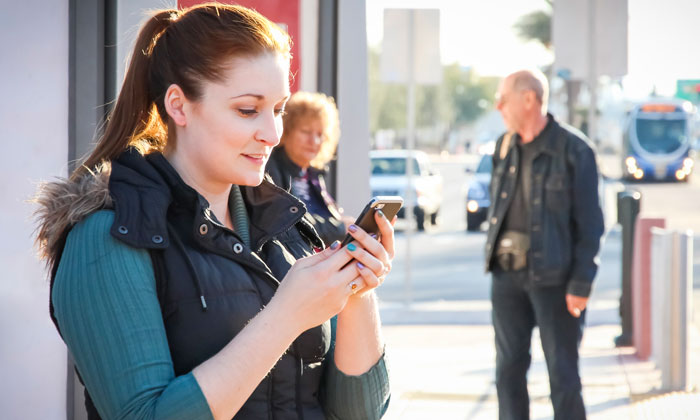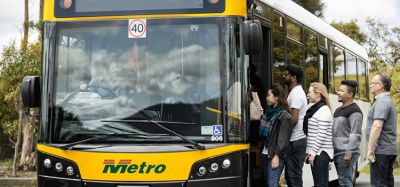Merging smart ticketing and smart planning into one smart transit app
- Like
- Digg
- Del
- Tumblr
- VKontakte
- Buffer
- Love This
- Odnoklassniki
- Meneame
- Blogger
- Amazon
- Yahoo Mail
- Gmail
- AOL
- Newsvine
- HackerNews
- Evernote
- MySpace
- Mail.ru
- Viadeo
- Line
- Comments
- Yummly
- SMS
- Viber
- Telegram
- Subscribe
- Skype
- Facebook Messenger
- Kakao
- LiveJournal
- Yammer
- Edgar
- Fintel
- Mix
- Instapaper
- Copy Link
Posted: 18 October 2017 | Tina Quigley | No comments yet
Tina Quigley, General Manager of the Regional Transportation Commission of Southern Nevada (RTC), discusses the RTC’s innovative mobile ticketing app, rideRTC, and how the app has been improved with the use of strategic partnerships.


PEOPLE are using their phones to do almost everything now, and many don’t think twice about using an app to make a purchase. Therefore, it makes sense that transit riders should also have the ability to easily and conveniently plan and pay for their trips with just a few taps on their phone. In 2016, the Regional Transportation Commission of Southern Nevada (RTC) launched the rideRTC mobile ticketing and trip planning app to provide this convenience to its customers – 67 per cent of whom use smartphones.
Committed to leveraging technology as a way to make the transit experience better for the more than 64 million annual boardings in the Las Vegas valley, the RTC had already introduced a mobile feature called RTC Ride Tracker to provide riders with an updated status of their bus’s arrival time. As the RTC moved forward with its effort to implement smart and integrated mobility solutions, it sought strategic partnerships that would help develop an easy-to-use and seamless smartphone app that enabled customers to both plan and pay for their transit trips.
Transit and trip planning
Real-time trip planning in the rideRTC app is provided through Transit, the leading public transit planning app in North America. Transit counts millions of dedicated users across 135 cities worldwide due to its user-friendly design, convenient features, and multimodal integrations. The app’s user experience, coupled with the fact that 20 per cent of the RTC’s customer base are tourists who are already active Transit customers, made Transit the best solution for the trip-planning component of the rideRTC app.
RTC customers can easily access Transit through an integrated link in the rideRTC app. When opened, Transit clearly displays the next buses that will depart in proximity to the user. The rider can instantly see when their bus will arrive in real time, receive notifications for any service disruptions, and set a reminder for when to leave to catch their bus.
Tourists or people not familiar with how to reach their destination can use the app’s real-time trip planner to find the best way to get to their destination across multiple transportation modes, including RTC Bike Share in downtown Las Vegas, Uber and the Las Vegas Monorail. Users can also receive step-by-step instructions to their destination and alerts if they may miss their bus and for when to get off.
The partnership has proven to be very successful. Transit is widely adopted among RTC customers with tens of thousands of unique monthly users and a combined total of over one million monthly sessions (the number of times the app is opened). Every month, over 8,000 people download the app in Las Vegas.
Masabi and smart ticketing
In addition to a robust trip planning component, the RTC wanted the app to also provide a secure and easy-to-use mobile ticketing capability that worked seamlessly from the same interface.
To develop the smart ticketing feature, the RTC partnered with Masabi, a global leader in mobile ticketing and fare collection solutions for transportation agencies. A ‘deep link’ was created between two best-of-breed technologies, so that customers using the rideRTC app can see real-time transit information and plan their journeys via the ‘My Bus’ button to access Transit’s interface, and then click back to seamlessly purchase tickets through Masabi’s JustRide platform.
The rideRTC app is configured to reflect the RTC’s brand and fare structure, giving riders the confidence that they can use Transit services and do not need to carry cash or buy passes from a ticket vending machine or a farebox. The move to a ‘buy before you board’ fare setup helps reduce dwell times because buses remain stationary for shorter periods at each stop, resulting in faster journeys for passengers. The mobile app enables secure ticket purchase in seconds and manages the fare, payments, ticket delivery and security.
The rideRTC app offers one of the fastest ticket purchase experiences of any mobile ticketing platform in the US, with intelligent design minimising the number of taps required to buy a ticket. Whether visitors use the app to travel along the Las Vegas strip with a two-hour pass or residents select the 30-day pass for their daily commute, tickets can be bought using both credit or debit cards, which can then be safely stored for quick reuse for future purchases.
Tickets can be purchased days, weeks and even months in advance of travel. Once a ticket is bought, it is delivered to the app’s Ticket Wallet where it is stored offline for future usage. All purchases are encrypted using bank-grade security and PCI DSS certified payments systems.
When passengers are ready to ride, they select the ticket they wish to use and activate it in the app, something which can be done even when they are offline. Once activated, the ticket displays a secure dynamic visual validation animation, with an interactive component that releases an encrypted QR code. As they board the vehicle, passengers simply scan their QR code by placing their phone screen on the validator that operates via the vehicle’s Wi-Fi connectivity (all RTC buses are equipped with free Wi-Fi).
Masabi’s JustRide platform also gives the RTC operations staff access to the JustRide Hub, a secure cloud-based back-office with critical tools for the administration of smart ticketing. The portal enables RTC staff to obtain real-time reporting and analytics; provide customer service; conduct validation asset management and monitoring; manage back-office and field user administration; and make fare updates when needed.
Enhancing the customer experience
The RTC believes that enhancing services with customer-friendly planning and ticketing options like the rideRTC app can make public transport a more accessible and viable option. So far, the app’s success has supported this premise. Since the introduction of rideRTC last year, passengers have purchased more than 160,000 passes, saving the agency approximately $16,000 in costs to print paper tickets. Averaging 6,800 app downloads per month, those savings are expected to continue to grow.
The RTC believes multimodal options will shape the future of transportation in Southern Nevada. A mix of traditional bus service, high-capacity transit, bike share and cycling amenities, shared ride and microtransit options, along with emerging transit technologies, will be needed to efficiently move the tens of millions of people who visit Las Vegas and who call the valley home.
In support of multimodal options, the RTC is looking at ways to partner with other transportation operators to create an integrated mobile payment system across services. While this effort is still in the early stages, the convenience of simple payments across multiple transportation systems is considered a high priority given its value to both residents and visitors.
The benefits of smart ticketing are clear: customers embrace opportunities to simplify their travel by using apps on their phone. Processing payments virtually saves on printing costs, reduces waste and improves travel time. Cloud-based operations management streamlines transit administration. Most of all, smart ticketing offers flexible and versatile solutions to meet customers’ needs while also responding to a rapidly changing transit industry which, in Southern Nevada, continues to evolve at break-neck speed. The future is here, and we are embracing it.
Biography


Related topics
Ticketing & Payments
Issue
IT Issue 1 2017
Related cities
United States of America
Related organisations
Masabi, Regional Transportation Commission of Southern Nevada (RTC)
Related people
Tina Quigley








